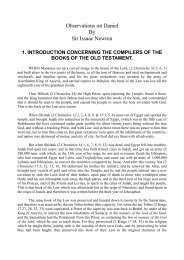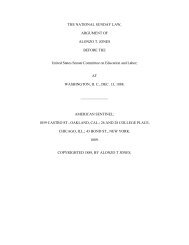by Percy E. Corbett - friendsofsabbath.org
by Percy E. Corbett - friendsofsabbath.org
by Percy E. Corbett - friendsofsabbath.org
You also want an ePaper? Increase the reach of your titles
YUMPU automatically turns print PDFs into web optimized ePapers that Google loves.
23<br />
"Caractacus is given official credit as being the first general to lead a Christian army in battle in<br />
defence of the faith. As Pendragon of the British, elected <strong>by</strong> them in open council, this is true.<br />
But it was Guiderius and Aviragus, whole led the first battle against the Romans. It was they<br />
who stopped Aulus Plautius in his tracks. Guiderius was the first British King to fall for Christ.<br />
. .<br />
"No better picture can be obtained of the relentless manner in which this-war was fought, with<br />
victory swinging from one side to the other, than <strong>by</strong> reading the reports of the foremost Roman<br />
writers, Tacitus, Martial, Juvenal and others. . . With ungrudging admiration they tell how the<br />
Silurian warriors, led <strong>by</strong> Caractacus, Aviragus and the Arch Priests, swept onward in<br />
irresistible waves over the bodies of their dead and dying comrades with battling savagery that<br />
appalled the hardened war scarred veterans of the Roman legions. For the first time the<br />
Roman soldiery heard the amazing motto of the ancient Druidic priesthood transferred into a<br />
clarion Christian battle cry. "V gwir er<strong>by</strong>n y <strong>by</strong>d" meaning "The truth against the World." It has<br />
lived through the ages and today is the motto of the Druidic Order in Wales. . . . "<br />
"Tacitus, the Roman historian, writing of the Claudian campaign that lasted for nine years,<br />
except for one brief six months' pause, dismally wrote that, although Rome hurled at the British<br />
the greatest army in her history, it failed to prevail against the military genius of Caractacus<br />
and the reckless fierceness of the British warrior. . . . " After two years of ceaseless warfare<br />
Claudius, recognising the futility of the struggle and the terrible drainage on his finest legions,<br />
took advantage of a reverse against Caractacus at Brandon Camp in A.D. 45 to seek peace<br />
through an armistice. A six month truce was declared in which Caractacus and Arviragus were<br />
invited to Rome to discuss the possibility of peace. The facts that followed prove that Claudius<br />
went to great lengths to come to satisfactory terms with the obstinate British leaders.<br />
Hoping to clinch the peace the Emperor Claudius offered to Arviragus in marriage his daughter<br />
Venus Julia and, amazing as it appears, they were married in Rome during the truce period in<br />
A.D.45.<br />
Here we have the strange instance of a Christian British King becoming son-in-law of the<br />
pagan Roman Emperor Claudius who had sworn to exterminate Christianity and Britain."<br />
During the six months truce Aulus Plautius, the Roman Commander, remained in Britain<br />
maintaining the truce on behalf of Rome. During this interval, he married Gladys, the sister of<br />
Caractacus. It is claimed that Gladys was converted, to Christianity <strong>by</strong> Joseph of Arimathea.<br />
On her marriage Gladys took the name of Pomponia, according to Roman custom. This was<br />
the name of the Plautian clan. Later, the name Graecina was added so that she was known as<br />
Pomponia Graecina Plautius. The added name was a distinctive academic honour conferred<br />
upon her in recognition of her extraordinary scholarship in Greek. As a result of this marriage,<br />
Emperor Claudius distrusted Aulus Plautius and recalled him to Rome in A.D.47.<br />
Gladys was put on trial and accused of being a Christian. The trial was recorded <strong>by</strong> Tacitus<br />
who wrote: "Pomponia Graecina, a woman of illustrious birth and the wife of Plautius who, on<br />
his return from Britain, entered the city with the pomp of an ovation, was accused of embracing<br />
the rites of a foreign superstition. The matter was referred to the jurisdiction of her husband,<br />
Plautius who, in conformity to ancient usage, called together a number of her relations and, in<br />
her presence, sat in judgement on his wife he pronounced her innocent."<br />
It was the custom, <strong>by</strong> Roman law, to give priority to the nobility to judge and settle any legal<br />
disputation where the family was concerned.

















